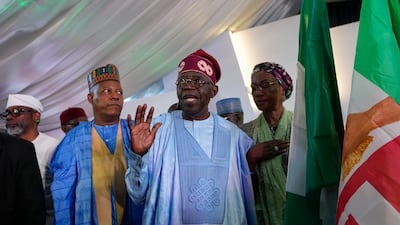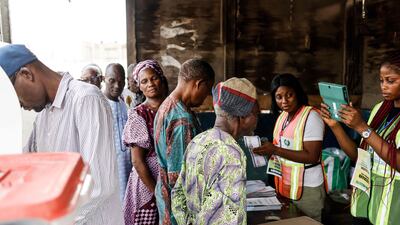Crowds of young people marched to the National Collation Centre in Abuja on Wednesday — Nigeria’s seat of power — protesting against an alleged list of problems with Saturday’s presidential and National Assembly elections.
At the top of that list are claims that voting machines were deliberately prevented from transmitting results to Abuja, and voter intimidation by thugs.
Results were announced on Wednesday with Bola Tinubu, 70, winning a four-year term with less than 50 per cent of the vote and pushing president Muhammadu Buhari from power.
Nigeria, Africa’s biggest economy, went to the polls last Saturday, but the elections were marked by alleged irregularities, such as voter suppression, glitches in the tallying of votes and the late arrival of election commission staff at polling booths.
There were also reports in some areas that the basic logistics of the poll had failed, with many voting centres apparently lacking equipment for casting secret ballots on the day. Claims of vote buying have further tainted the poll.
With determination etched on their faces, the crowd chanted “Inec use the Bivas! INEC chairman must be fired! Our votes must count!”
It was a call directed at Nigeria’s election umpire, the Independent National Electoral Commission (Inec).
The protesters demanded the firing of Inec chairman Mahmood Yakubu, claiming the agency had broken a pledge to use an electronic voting system called the Bimodal Voter Accreditation System (Bvas).
Protests say falsified results and other election malpractices favoured the candidate of the ruling All Progressives Congress (APC), Mr Tinubu, who was declared the winner after polling 8,794,726 votes.
He defeated contenders including Atiku Abubakar of the opposition People’s Democratic Party (PDP), who polled 6,984,520 votes, while Labour’s Peter Obi gained 6,101,533 votes, placing him third. Trailing them was the candidate of the New Nigeria People’s Party (NNPP) Rabiu Kwankwaso, with 1,496,687 votes.
Despite the public display of anger, Nigeria registered an increase in voter participation, some good news in a country where vote-buying and violence often distort elections.
Nigeria is a youthful country, with more than half of its 200 million people under the age of 35. This demographic is said to feel passionately about critical issues such as insecurity, police violence, the economy and mass unemployment.
Inec said it recorded more than 93 million eligible voters after the removal of people who had registered to vote twice and underage voters.
According to the figures, the total number of eligible voters rose by 9,464,924 or 11.3 per cent from the 84,004,084 recorded in the 2019 general elections, to 93,469,008.
Moses Paul, president of the Yell Out Nigeria Initiative, an independent pressure group leading the protests, said the results being collated were fraudulent.
“All we are demanding are three things," he told The National. "We need the collation of results to stop because it's fraudulent. We need a reversal of the original results, and we are asking for the immediate sacking of the compromised Inec chairman and for president Muhammadu Buhari to take responsibility and account for what’s going on in the country."
He also alleged collusion by security operatives and electoral officials including Inec assistants in Lagos, Port Harcourt, other southern states and the north of the country.
“All assurances given by President Muhammadu Buhari to ensure a free, fair, credible and all-inclusive poll grew stale on election day, coalescing into a seemingly grand plan to stifle the chances of the real winner of the 2023 general election," he said.
“From snatching of ballot boxes, destruction, mutilation and voiding of votes, threatening voters with ethnic slurs, late arrival of election materials, non-transmission of results to the server, voting by minors and many more problems, these atrocious activities grew in deliberateness."
Jesse Halliday, another protester in Abuja, said the protesting youths were unafraid of the government and security forces: “I don’t even think that it crossed anybody’s mind that the military would clamp down on us because we know that we are fighting the right course. We are fighting for the soul of our country because the old politicians have refused to do the right thing.”
Paul Mashote, a Lagos based human rights lawyer, says the citizens’ rights to protests cannot be misinterpreted to mean an offence against the state.
“So, if young citizens are out, protesting the conduct of the election, it is within their rights to do so, but such rights must be exercised with caution, to ensure that the protest is not hijacked by hoodlums,” Mr Mashote told The National.
In Abakaliki, the capital of Ebonyi in the south-east, visibly angry youths marched to the Inec office in Abakaliki.
Obinnaya Agbo, a member of the Labour Party and one of the protesters, said Inec had dashed voters' hopes with its broken promise of electronic transmission of results from polling units. It was his second time voting in Nigeria’s general elections.
“The flag bearer of the Labour Party, Peter Obi, won the presidential elections, but it was rigged," Mr Agbo claimed. "It’s obvious that the election is not free and fair ... some of the APC candidates with their thugs in broad daylight, went round snatching ballot boxes. Election wasn't held in some of the polling booths, but they came up with results.”
























